“How long does a CPU last?” A CPU can last anywhere from 3 to 10 years, depending on usage and quality. Factors such as overclocking, high temperatures, and voltage can shorten a CPU’s lifespan.
Have you ever wondered how long your CPU will last? In this article, we will explore the factors that affect the lifespan of a CPU and provide tips on how to prolong its life. Following our guide, you can keep your CPU running smoothly for years.
What you must follow in the tutorial: How Long Does A CPU Last?
To follow this tutorial, you will need the following:
- A computer with a CPU
- Monitoring software (e.g. HWMonitor, Core Temp)
- Thermal paste
- A heatsink/fan
- A stable power supply
There are alternatives to some of these items, such as liquid cooling instead of a heatsink/fan. However, we recommend using a heatsink/fan for most users due to its affordability and ease of installation.
Related Read
- What is CPU Virtualization Technology?
- What Socket Type is Soldered To The Motherboard, Along With The CPU?
- How To Install Windows 11 on an Unsupported CPU?
Step-by-step instructions: How Long Does A CPU Last?
- Monitor CPU temperature
Using monitoring software, keep an eye on your CPU’s temperature. High temperatures can significantly reduce the lifespan of a CPU.
- Apply thermal paste
Remove the heatsink/fan and apply a pea-sized amount of thermal paste on the CPU. This will help transfer heat from the CPU to the heatsink/fan.
- Clean the heatsink/fan.
Clean the heatsink/fan with a soft brush or compressed air to remove dust or debris. This will help it run more efficiently.
- Reapply the heatsink/fan.
Reattach the heatsink/fan to the CPU and make sure it is securely fastened.
- Use a stable power supply.
A stable power supply is essential to keep your CPU running smoothly. Use a high-quality power supply to avoid power surges or other issues damaging your CPU.
Also, Read
What are the signs of a dead or failing CPU?
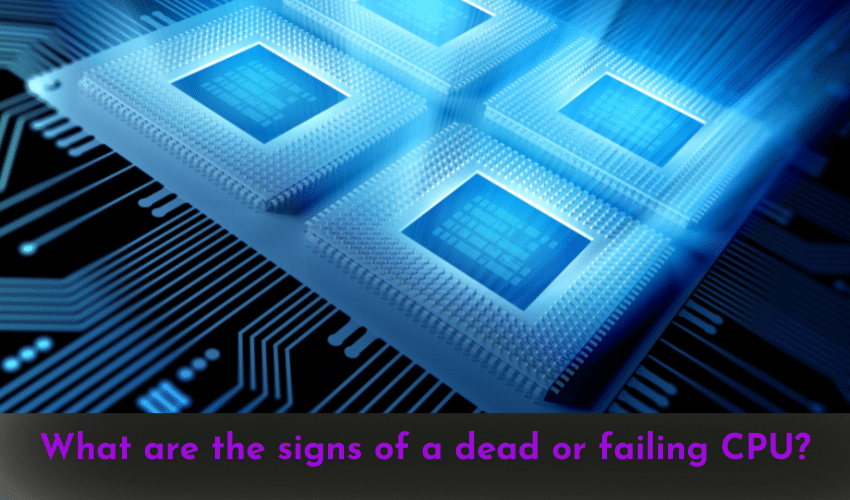
A CPU (Central Processing Unit) is a critical computer system component. If the CPU fails or becomes dead, it can cause a system to malfunction or not boot. Here are some signs that could indicate a dead or failing CPU:
- Computer won’t boot: The most common sign of a dead or failing CPU is that the computer won’t boot. When you press the power button, the computer may not turn on or might turn on but not display anything on the screen.
- System crashes: If your computer frequently crashes, freezes, or experiences random reboots, it could be a sign of a failing CPU.
- Overheating: CPUs generate heat, but if the CPU temperature exceeds safe limits, it can cause the computer to shut down. If you notice that your computer is running hotter than usual, it could be a sign that the CPU is failing.
- Error messages: When a CPU fails, it may generate error messages. These messages can be related to hardware or software issues and may appear during boot-up or when running specific applications.
- Slow performance: If your computer takes longer than usual to perform simple tasks, it could indicate that the CPU is struggling to keep up.
- Blue Screen of Death (BSOD): A BSOD is a Windows error message that appears when the operating system encounters a critical error. If the error is related to the CPU, it could be a sign of a failing CPU.
If you suspect your CPU is failing, taking action quickly is essential. Using a failing CPU can cause further damage to your computer and potentially lead to data loss.
Also, Read
- How To Check What CPU I Have?
- What Are The Best Places To Buy PC Parts, CPUs & Graphics Cards Online?
- How To Check Cpu? (And How Fast it is)
If something fails, it’s probably not the CPU – do these tests.

If your computer exhibits issues, it may not necessarily be a failing CPU. Several components of a computer system could cause problems, including the RAM, hard drive, power supply, and more. Before assuming that the CPU is at fault, performing some tests to rule out other potential causes is essential.
Here are some tests you can perform:
- Memory test: Use a tool like Memtest86 to test your RAM for errors. Faulty RAM can cause various issues, including system crashes and slow performance.
- Hard drive test: Use a tool like CrystalDiskInfo to check the health of your hard drive. If your hard drive fails, it can cause slow performance, data loss, and other issues.
- Power supply test: If your computer is randomly shutting down or not powering on, it could be a sign of a failing power supply. Use a multimeter to test the output of your power supply.
- Malware scan: Malware infections can cause various issues, including slow performance, system crashes, etc. Run a malware scan using a tool like Malwarebytes to rule out malware as the cause of the problem.
- Update drivers: Outdated drivers can cause issues with your computer’s performance. Use a tool like Driver Booster to update your drivers to the latest version.
By performing these tests, you can rule out other potential causes of computer issues before assuming that the CPU is at fault. If you’re still experiencing issues after performing these tests, it may be time to seek professional help or replace the CPU.
Also, Read
- How to Remove a CPU Cooler or Fan Without Damaging the Motherboard?
- How to Clean A CPU Fan Of Your Computer System in 5 Simple Steps?
- How To Install A Liquid Cooling System (AIO) On Your CPU?
How Long Do Intel Processors Last?
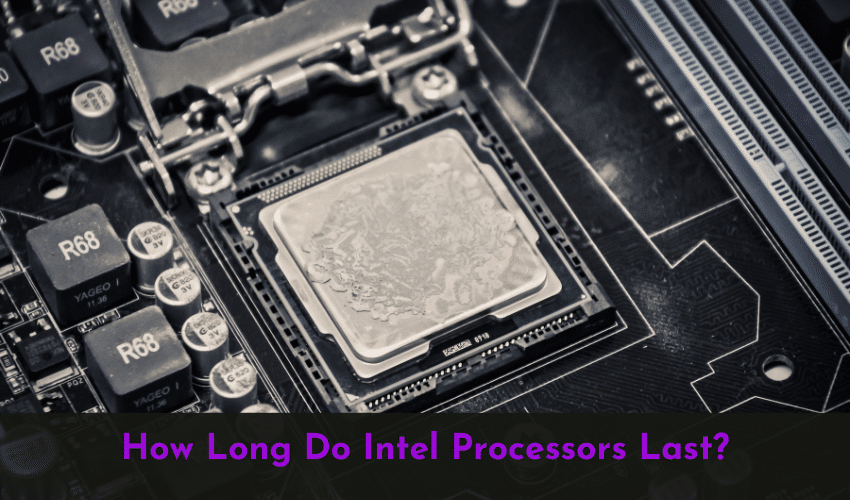
Intel processors are designed to last several years, and their lifespan can depend on several factors, such as usage, maintenance, and manufacturing defects. An Intel processor can generally last 5-10 years or more, depending on how it’s used and maintained.
The lifespan of an Intel processor can also depend on the generation of the processor. Older processors may have a shorter lifespan than newer ones, as they may need to be compatible with the latest software and operating systems.
It’s important to note that the lifespan of an Intel processor can also be affected by external factors such as heat and overclocking. Overclocking the processor beyond its rated specifications can cause it to fail more quickly, while excessive heat can damage the processor over time.
To maximize the lifespan of your Intel processor, it’s essential to ensure proper cooling, avoid overclocking beyond the recommended specifications and keep the processor and its surrounding area clean and dust-free. It’s also a good idea to update the processor’s firmware and drivers regularly to ensure it’s working efficiently and compatibly with the latest software and hardware.
Intel processors can last several years, but their lifespan can depend on several factors. By following best practices for usage and maintenance, you can help ensure your Intel processor lasts as long as possible.
Also, Read
- What is a CPU (Central Processing Unit)? What CPU Stands For?
- How to lower CPU usage on Windows 10?
- How to Apply Thermal Paste to a CPU? (A Step-by-Step Guide)
Any difference in how long do i3, i5, i7, and i9 CPUs last?

The lifespan of CPUs (Central Processing Units) depends on various factors such as usage, temperature, overclocking, and manufacturing defects rather than the specific model of the CPU. Therefore, there is no definitive answer to how long i3, i5, i7, and i9 CPUs last.
However, modern CPUs are generally built to last several years, and their lifespan is not significantly affected by their model. For example, if you use a CPU for its intended purpose and maintain it well, you can expect it to last at least five to ten years. Some CPUs may even last longer than that.
It’s also important to note that the speed and performance of a CPU will gradually decrease over time as newer and more advanced models become available. However, this doesn’t necessarily mean that the CPU has reached the end of its lifespan. Instead, it may need help to keep up with the demands of newer software and applications.
In summary, while the specific model of a CPU may not significantly impact its lifespan, proper usage, maintenance, and upgrades can ensure that it lasts for many years.
How Long Do AMD Processors Last?

The lifespan of AMD processors, like any other CPU, depends on various factors such as usage, temperature, overclocking, and manufacturing defects. However, AMD processors are generally built to last for several years.
If you use an AMD processor for its intended purpose, keep it cool and clean, and avoid overclocking beyond its recommended specifications, you can expect it to last at least five to ten years. Some AMD processors may even last longer than that.
The speed and performance of an AMD processor may gradually decrease over time as newer and more advanced models become available. However, this does not necessarily mean that the processor has reached the end of its lifespan. Instead, it may need help to keep up with the demands of newer software and applications.
In summary, the lifespan of an AMD processor depends on various factors, but with proper usage, maintenance, and upgrades, you can expect it to last for several years.
Also, Read
- CPU vs. GPU Rendering – What’s the difference, and which should you choose?
- Boosting V-Ray Benchmark Efficiency: Analyzing CPU and GPU Scores for Optimal Performance
- Does Overclocking Reduce Lifespan of CPU or GPU?
How often do Ryzen CPUs fail?
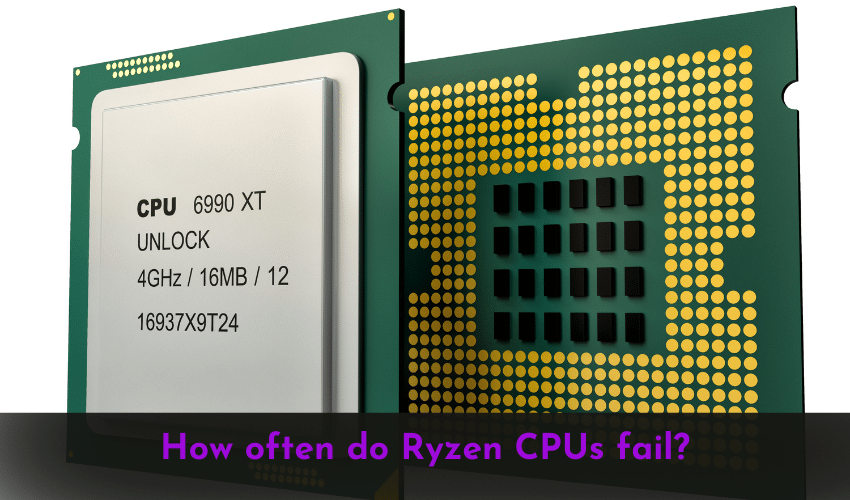
Like any other electronic component, Ryzen CPUs can fail due to manufacturing defects, improper handling, overheating, or other factors. However, the failure rate of Ryzen CPUs is relatively low, and most users do not experience any issues.
It’s important to note that the failure rate of Ryzen CPUs can also vary depending on the specific model and usage. For example, using a Ryzen CPU for heavy workloads or overclocking beyond its recommended specifications may be more prone to failure.
However, suppose you use a Ryzen CPU to keep it cool and clean and avoid overclocking beyond its recommended specifications. In that case, you can expect it to last several years without issues.
Overall, while Ryzen CPUs can fail like any other electronic component, the failure rate is relatively low, and most users do not experience any issues with their Ryzen CPUs.
Also, Read
- Best Motherboards for AMD Ryzen 5000 Series CPUs 5950X, 5900X, 5600X
- CPUID HWMonitor Pro: Ultimate Guide To Understanding And Using This Powerful Tool
- How To Check CPU Temp With MSI Afterburner?
How Long Does a CPU Last for Gaming?
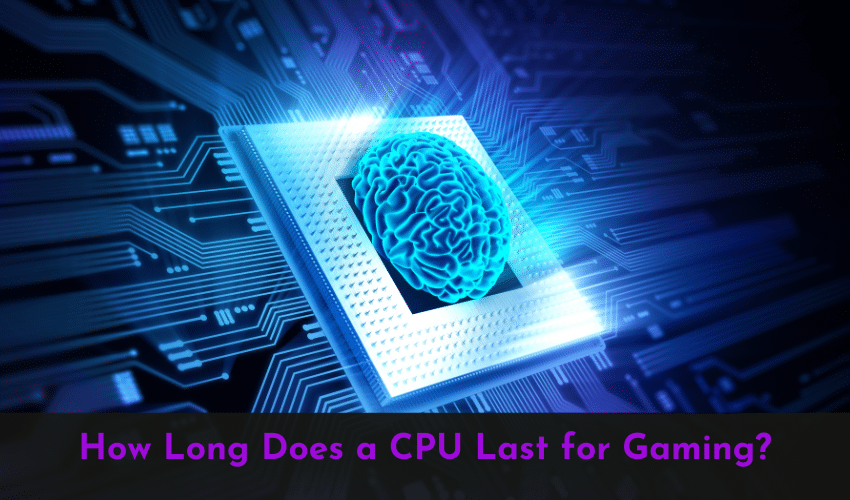
The lifespan of a CPU used for gaming depends on several factors, such as the model, usage, temperature, and maintenance. However, a CPU used for gaming can generally last several years.
Suppose you use a CPU for gaming and maintain it properly by keeping it clean, avoiding overheating, and avoiding overclocking beyond its recommended specifications. In that case, you can expect it to last at least five to ten years. Some CPUs may even last longer than that.
The speed and performance of a CPU used for gaming may gradually decrease over time as newer and more advanced games are released. However, this does not necessarily mean that the CPU has reached the end of its lifespan; rather, it may no longer be able to keep up with the demands of newer games.
How Long Do Overclocked CPUs Last?
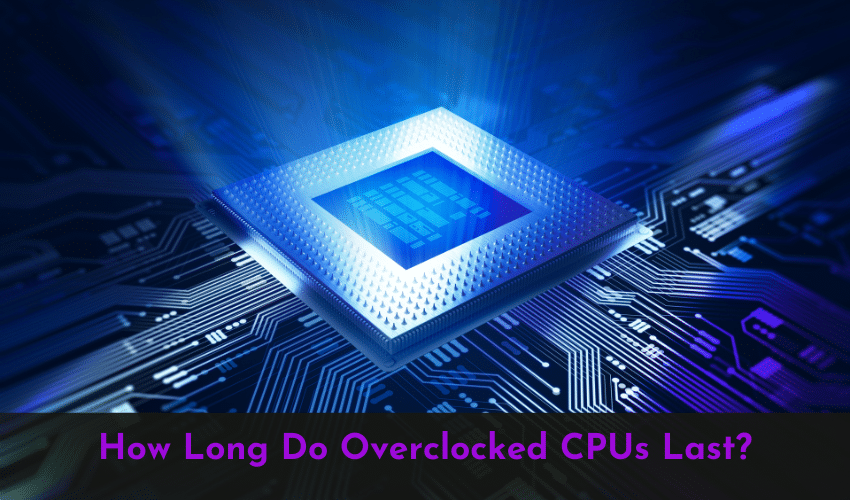
Overclocking a CPU, or running it at a higher clock speed than its default settings, can increase its performance and put additional stress on the processor. As a result, the lifespan of an overclocked CPU may be shorter than that of a non-overclocked CPU.
An overclocked CPU’s lifespan depends on several factors, such as the extent of the overclock, the quality of the cooling solution used, and the specific CPU model. However, generally speaking, an overclocked CPU can last several years if properly cooled and not pushed beyond its safe limits.
It’s worth noting that overclocking a CPU may void its warranty and increase the risk of instability or failure. Additionally, the performance gains from overclocking may sometimes be insignificant enough to justify the risks and potential reduction in lifespan.
In summary, the lifespan of an overclocked CPU can vary depending on several factors, but with proper cooling and safe overclocking practices, it can still last for several years. However, it’s essential to consider the risks and potential drawbacks of overclocking before attempting it.
Also, Read
- How To Check The CPU And GPU Temperature In Windows 11 Or 10?
- How To Check & Monitor CPU and GPU Temperature In Ubuntu (Linux 2023)
- How to monitor CPU and GPU temp while gaming?
How Long Can a CPU Last Without Thermal Paste?
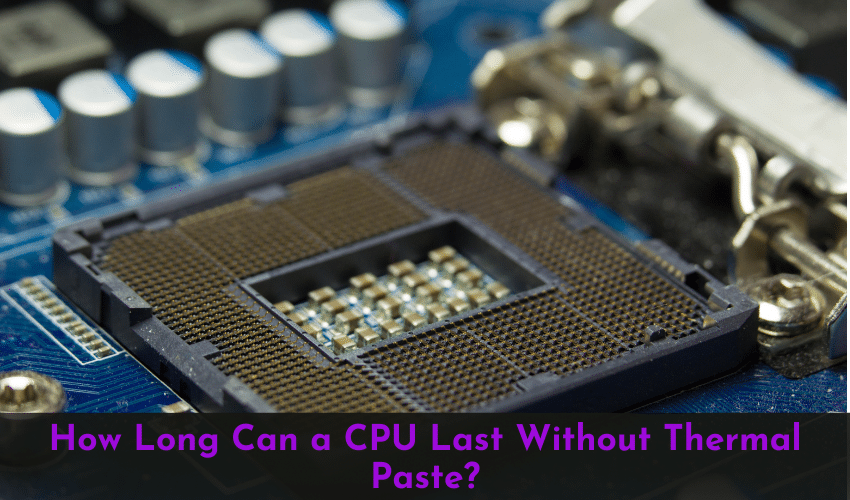
Thermal paste is crucial in ensuring that a CPU remains cool while in operation. Without thermal paste, the CPU may overheat and become damaged, potentially leading to a shorter lifespan or even failure.
The exact amount of time that a CPU can last without thermal paste depends on several factors, such as the specific model of the CPU and the ambient temperature. However, generally speaking, a CPU without thermal paste can overheat and become damaged within minutes.
It’s important to note that thermal paste is relatively inexpensive and easy to apply and should be replaced periodically to ensure optimal performance and longevity of the CPU. Some CPUs may come with pre-applied thermal paste, which may reduce the need for manual application.
In summary, using a CPU without thermal paste can lead to overheating and potentially cause damage or failure within a matter of minutes. Therefore, it’s essential always to use thermal paste when installing or replacing a CPU and to replace it periodically to ensure optimal performance and longevity of the CPU.
How Long Can a CPU Last Without a Cooler or Heatsink?

A CPU generates heat during operation and requires a cooler or heatsink to dissipate that heat and prevent the CPU from overheating. Without a cooler or heatsink, the CPU may overheat and become damaged, potentially leading to a shorter lifespan or even failure.
The exact amount of time that a CPU can last without a cooler or heatsink depends on several factors, such as the specific model of the CPU, the ambient temperature, and the workload being performed. However, generally speaking, a CPU without a cooler or heatsink can overheat and become damaged within seconds or minutes.
It’s important to note that a CPU cooler or heatsink is a crucial component in ensuring optimal performance and longevity of the CPU. Even if a CPU can function without a cooler or heatsink for a short period, it’s not recommended to operate the CPU in this manner.
In summary, using a CPU without a cooler or heatsink can lead to overheating and potentially cause damage or failure within seconds or minutes. Therefore, it’s essential always to use a cooler or heatsink when installing or replacing a CPU and to ensure that it is properly installed and functioning to prevent overheating and potential damage to the CPU.
Conclusion
We hope this guide has helped answer how long a CPU lasts and provided some tips on extending its lifespan. By monitoring your CPU’s temperature, applying thermal paste, and keeping your heatsink/fan clean, you can help ensure your CPU lasts for years.
Consider sharing your thoughts in the comments and share this article with your friends who might find it helpful. And if you want to take your CPU maintenance to the next level, consider our premium offer for a comprehensive CPU maintenance toolkit.
